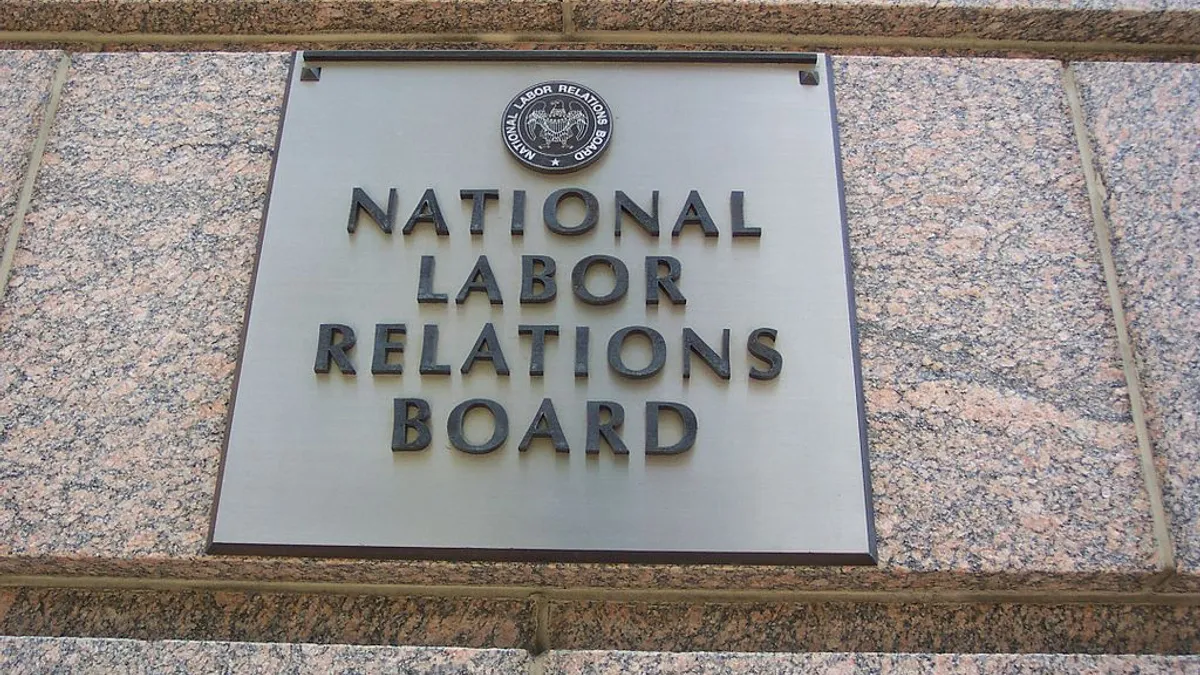Dive Brief:
- The National Labor Relations Board (NLRB) will publish a final rule on Wednesday updating its joint employer standard, according to a Feb. 25 statement.
- The final rule states that an entity may be considered a joint employer of a separate employer's employees only if it possesses and exercises substantial direct and immediate control over the employees' essential terms of employment. These essential terms are "exclusively defined," NLRB said, as wages, benefits, hours of work, hiring, discharge, discipline, supervision and direction.
- The rule will take effect April 27, according to NLRB, although the final date will be determined by the date of publication in the Federal Register.
Dive Insight:
NLRB's updated rule effectively overturns the joint-employer standard established by the Obama-era NLRB’s 2015 decision in Browning-Ferris Industries. With a Republican majority, NLRB originally sought to overturn Browning-Ferris via a 2017 decision in a separate dispute, but the board later vacated its decision due to conflict of interest concerns involving one of the majority board members.
The final rule signals a possible end to employers' "five to six year nightmare" over joint employer liability under the National Labor Relations Act (NLRA), Michael Lotito, shareholder and co-chair of the Workplace Policy Institute at Littler Mendelson, told HR Dive in an interview. Specifically, the board's identification of essential terms or conditions and employment was "critical" for employers as they consider the updated regs.
The rule contains some changes from NLRB's Notice of Proposed Rulemaking (NPRM). For example, the final rule states, as does the NPRM, that an entity is a joint employer of a separate employer's employees only if both entities "share or codetermine the employees' essential terms or conditions of employment." But the final rule further defines the phrase "share or codetermine."
It's also notable that the U.S. Department of Labor promulgated its own joint-employer rule implementing the Fair Labor Standards Act and the U.S. Equal Employment Opportunity Commission has expressed interest in a similar rule for federal nondiscrimination laws. Some stakeholders have asked Congress to intervene and legislate one joint employment definition for all federal laws but the movement has yet to see success.
In a statement, officials from the Economic Policy Institute (EPI), a progressive think tank, criticized the NLRB's rule for narrowing the circumstances under which a firm can be found to be a joint employer and said it would enable firms to avoid responsibility and liability under the NLRA. In a public comment on the proposed rule, EPI estimated the regulation would cost subcontracted and temporary U.S. workers $1.3 billion in lost wage increases due to its potential impact on collective bargaining.
"Weakening the joint-employer standard has serious adverse consequences for working people, such as depriving workers of the ability to bargain with the employer contracting for their services through an intermediary, who in most cases is the employer with ultimate control over wages, hours, and working conditions," Celine McNicholas, EPI director of government affairs, and Heidi Shierholz, EPI senior economist and director of policy, wrote.
Though the regulation overturns Browning-Ferris, it also acknowledges the relevance of some forms of indirect control to the joint-employer analysis, a key aspect of the board's decision in Browning-Ferris, Philip Miscimarra and Harry Johnson, both former NLRB members and now partners at Morgan, Lewis & Bockius, told HR Dive in an interview. The rule states that "evidence of indirect control over essential terms and conditions of employment is probative of joint-employer status, but only to the extent that it supplements and reinforces evidence of direct and immediate control over essential terms and conditions of employment."
The rule could still be subject to legal challenges. That said, Lotito advised employers to consult with legal counsel in preparation for the rule's implementation. "This is not an area where rookies should apply," he said. "You need people who have real insight and sensitivity to the rules and their application to the real world."
















